|
|
|
Sort Order |
|
|
|
Items / Page
|
|
|
|
|
|
|
| Srl | Item |
| 1 |
ID:
138268


|
|
|
|
|
| Summary/Abstract |
Amid the fallout from the Scottish independence referendum, a UK constitutional convention has been proposed as a mechanism to take stock not only of the referendum, but also of the past fifteen years of devolution. However, despite longstanding conceptions of British constitutional development, a constitutional convention would not herald a brave new world for the UK's constitution. As the article highlights, in the past hundred years there have been two attempts to treat the territorial constitution in the round: the Speaker's Conference on Devolution, 1919–1920 and the Royal Commission on the Constitution, 1969–1973. This article examines both of these forums, arguing that they provide clear warnings for a future UK constitutional convention, in particular the threat of internal division that any such forum risks facing. A danger that this article highlights is heightened by the associated difficulty of reaching agreement across the UK's ‘state of unions’.
|
|
|
|
|
|
|
|
|
|
|
|
|
|
|
|
| 2 |
ID:
107204


|
|
|
|
|
| Publication |
2011.
|
| Summary/Abstract |
Despite increasing support for participatory and deliberative principles amongst academics, practitioners and parliamentarians alike, efforts to infuse political systems with more inclusive and consensual forms of debate often founder. This article explores this conundrum by examining institutional reforms through the lens of deliberative democracy. More specifically, we scrutinise attempts to institutionalise forms of civic deliberation within the Scottish political system via the Scottish Civic Forum and the Scottish Parliament's committee system. Our analysis tells the story of how these two types of institutional reform, both designed to facilitate the move towards a more participatory and deliberative model of democracy in Scotland, have fared over a ten-year period. In turn, this analysis allows us to comment on the ways in which deliberative and parliamentary democracy may be integrated.
|
|
|
|
|
|
|
|
|
|
|
|
|
|
|
|
| 3 |
ID:
138875
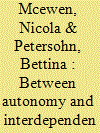

|
|
|
|
|
| Summary/Abstract |
Drawing on the distinction between self-rule and shared rule in multilevel states, this article argues that shared rule has been the neglected element of the UK devolution settlement. The ability of the devolved administrations to participate in, and influence, national decision making through shared rule mechanisms is very limited. The article argues that the lack of shared rule is especially problematic in light of the increasing complexity of the Scottish devolution settlement in the wake of the Scotland Act 2012 and the Smith commission report. Smith, in particular, seems set to increase both the power of the Scottish Parliament and its dependence on UK policy decisions in the areas of tax, welfare and the economy. Creating a more robust intergovernmental system which could manage these new interdependencies will be a significant challenge, and yet, without such a system, the new settlement will be difficult to sustain.
|
|
|
|
|
|
|
|
|
|
|
|
|
|
|
|
| 4 |
ID:
145555


|
|
|
|
|
| Summary/Abstract |
Two issues currently dominate the UK's constitutional landscape: the UK's membership of the European Union (EU) on the one hand; and the unsettled constitutional settlements between the UK and the devolved administrations of Scotland, Wales and Northern Ireland on the other. This article considers these two issues in concert. It stresses the distinct relationships between the EU and the devolved territories within the UK—concerning both devolved and non-devolved policy areas—highlighting the salience of a devolved perspective in any consideration of UK–EU relations. Despite its importance, sensitivity to this has been lacking. The article explores the implications of a ‘Leave’ or ‘Remain’ outcome on the future of the internal territorial dynamics within the UK. While there are too many unknowns to be certain of anything, that there will be knock-on effects is, however, beyond doubt.
|
|
|
|
|
|
|
|
|
|
|
|
|
|
|
|
| 5 |
ID:
084487
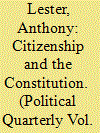

|
|
|
|
|
| Publication |
2008.
|
| Summary/Abstract |
The status of "British subjects", the relationship between the individual and the State, and the concept of "rights" and "liberties" are relevant to the current political debate about "British identity", citizenship, "multiculturalism", a "British Bill of Rights", and whether there is now a need for a written constitution. This article describes the confused contemporary understanding of what is meant by "British" citizenship and analyses the parallel developments of citizenship and our constitutional arrangements. The Human Rights Act, devolution and Gordon Brown's proposed constitutional renewal are important steps in setting out the ideas and principles that bind us together as a nation. Together with a coherent definition of the rights and obligations of British citizenship, constitutional reform would achieve a stronger sense of what it means to be British today.
|
|
|
|
|
|
|
|
|
|
|
|
|
|
|
|
| 6 |
ID:
174563


|
|
|
|
|
| Summary/Abstract |
In the Kenyan context of new resource discoveries and an ambitious devolution programme, and what is argued to be a shrinking of civic space globally, the role of civil society organisations (CSOs) working on natural resource governance is critical. The resilience, space and capacity of civil society to engage in the policy process, from community-based organisations to national non-governmental organisations, all shape outcomes in terms of legislation, policy and management of scarce resources. Drawing on interviews with CSOs from across Kenya, following the new 2010 constitution and devolution programme, this article explores how new negotiated spaces of participation around resource governance have emerged in Kenya. Using multidimensional frameworks to analyse power relations, it explores how Kenyan CSOs are cautiously redefining roles, offering expertise when devolved governments struggle, and standing up to powerful interests of corporate lobbies with varying degrees of success.
|
|
|
|
|
|
|
|
|
|
|
|
|
|
|
|
| 7 |
ID:
105871
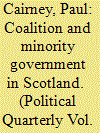

|
|
|
|
|
| Publication |
2011.
|
| Summary/Abstract |
The United Kingdom general election result in 2010 produced a hung or balanced parliament for the first time in over three decades. Since the United Kingdom has limited postwar experience of this outcome, it is natural that commentators have begun to look elsewhere for lessons on the practicalities of minority and coalition government. This article considers the lessons we can learn from the Scottish parliamentary experience since 1999. It outlines two main points of comparison: strength and stability. One might assume that coalition provides more of both than minority government. Indeed, for that reason, it is rare for central or devolved governments in the United Kingdom to operate as minorities through choice. Yet, the Scottish experience shows that the differences between coalition and minority government are not completely straightforward. Much depends on the institutional context and, in many cases, idiosyncratic elements of particular systems. Consequently, one can identify a trade-off in comparative analysis: as the identification of elements specific to one system increases, the ability to draw clear meaningful lessons decreases.
|
|
|
|
|
|
|
|
|
|
|
|
|
|
|
|
| 8 |
ID:
105872
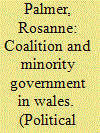

|
|
|
|
|
| Publication |
2011.
|
| Summary/Abstract |
Post-devolution Wales has had experience of a variety of different types of government and a variety of different parties in government; single party rule with one party gaining an overall majority of the seats (Labour, 2003-05), minority administrations (Labour, 1999-2000, 2005-07) and coalitions between Labour and the Liberal Democrats (2000-03) and Labour and Plaid Cymru (2007 to date). This article explores the experiences of both minority and coalition government in Wales, focusing most notably on the convoluted process of coalition formation in 2007, before proceeding to draw lessons for the United Kingdom coalition government based upon developments in Wales.
|
|
|
|
|
|
|
|
|
|
|
|
|
|
|
|
| 9 |
ID:
089912
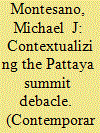

|
|
|
|
|
| Publication |
2009.
|
| Summary/Abstract |
The abrupt collapse of the ASEAN Plus Three and East Asian Summits at Pattaya on 11 April 2009 initiated four days of extreme political tension in Thailand. This tension both epitomized the current "red"-"yellow" polarization in Thai politics and society and represented the surface manifestation of deep pathologies in the Thai body politic. Four of these pathologies are the structure of the post-1997 economy, the figure of former Prime Minister Thaksin Shinawatra, the continuing war in the far south and concerns surrounding the end of the current reign. These pathologies leave Thailand in an incipient revolutionary situation, albeit one that must be clearly distinguished from the "revolution" that Thaksin tried to precipitate through street violence in April 2009. The seriousness of Thailand's pathologies notwithstanding, comparative perspectives offer the hope of peaceful progress towards the emergence of a new, more egalitarian Thailand.
|
|
|
|
|
|
|
|
|
|
|
|
|
|
|
|
| 10 |
ID:
155419


|
|
|
|
|
| Summary/Abstract |
Since the establishment of devolution in 1999, Northern Ireland's power-sharing governments have been fragile and prone to crisis. However, following a decade of relative stability and cooperation between Nationalists and Unionists at Stormont, hopes were high that the devolved arrangements had finally become embedded and more resistant to collapse. This optimism was dashed when Sinn Féin brought down the devolved institutions in January 2017. A snap election once again returned the Democratic Unionist Party (DUP) and Sinn Féin as the largest parties and their inability to form a government resulted in yet another political stalemate. This article begins by outlining the pattern of political crises in Northern Ireland and assesses both the trigger factors and the responses. It then goes beyond the most obvious explanation for this continuing instability—that of the deep sectarian based divisions—and points to a number of other reasons for the volatility. These include issues such as the incomplete implementation of previous agreements, the impact of broader UK policies and the shadow of Direct Rule.
|
|
|
|
|
|
|
|
|
|
|
|
|
|
|
|
| 11 |
ID:
164150


|
|
|
|
|
| Summary/Abstract |
What was the scope of the Bosnian jihadi participation in the war in Syria? Did the Bosnian volunteers tend to join one particular faction? Why did the Bosnian youngsters decide to join the holy war in the Levant? Was this an organized and hierarchical process or was this a grassroots movement? Last, were all the Salafis in Bosnia supportive of this dynamic or did this process cause internal frictions? These are some of the questions that this research will try to answer.
|
|
|
|
|
|
|
|
|
|
|
|
|
|
|
|
| 12 |
ID:
141848
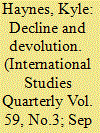

|
|
|
|
|
| Summary/Abstract |
This paper offers a theory of military retrenchment by states in relative decline. I argue that a declining state will choose to withdraw foreign military deployments and security commitments when there exists a suitable regional “successor” to which it can devolve its current responsibilities. The degree of a successor's suitability and the strategic importance of the region to the declining state interact to determine when and how rapidly retrenchment will occur. Importantly, this devolutionary model of retrenchment predicts significant variations in retrenchment patterns across a declining state's multiple regional commitments. It advances the literature by producing nuanced predictions of precisely where, when, and how quickly retrenchment will occur. This paper assesses the theory empirically through an examination of Great Britain's varying regional retrenchment strategies prior to World War I.
|
|
|
|
|
|
|
|
|
|
|
|
|
|
|
|
| 13 |
ID:
163744
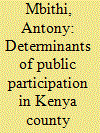

|
|
|
|
|
| Summary/Abstract |
The Constitution of Kenya 2010 introduced a framework for devolving public resources in Kenya’s forty-seven Counties. The Counties were given the responsibilities of maintaining health, roads and agriculture, among others. Using the Afrobarometer (2015) survey, we employ probit regression to examine the determinants of successful public participation in the Counties. We find that approval of the Governor’s performance has a positive and significant influence on public participation. However, difficulty among the citizenry in influencing County decision-making; lack of responsive County Assembly Members; difficulty in accessing information on County budgets, legislation and projects; and corruption in the Governor’s office have a negative significance.
|
|
|
|
|
|
|
|
|
|
|
|
|
|
|
|
| 14 |
ID:
145176
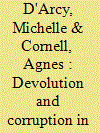

|
|
|
|
|
| Summary/Abstract |
How does decentralization affect patronage and rent seeking? While centralization is seen as enabling these practices, many expect decentralization to reduce them. With few examples of meaningful reform it is difficult to establish if this is the case in the context of African states. We look at the impact of decentralization on rent seeking and patronage in Kenya, where the devolution of significant powers to county governments has recently taken place. We suggest that devolution has not removed these practices but rather brought them down to the local level in response to popular expectations that it is “everyone's turn to eat”. The realization of this expectation for a broad constituency of ethnic groups and elites has facilitated – so far – the embedding of these reforms. Our findings thus suggest that the implementation of meaningful decentralization has been achieved via the decentralization of patronage networks, meaning that the “our turn to eat” character of ethnic patronage politics persists. As a result, although a greater number of groups now have their turn, ethnic minorities within some counties feel marginalized, including certain trapped minorities from politically relevant groups.
|
|
|
|
|
|
|
|
|
|
|
|
|
|
|
|
| 15 |
ID:
149246
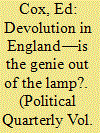

|
|
|
|
|
| Summary/Abstract |
This article explores the extent to which devolution within England can address the general malaise that is often described as ‘the English Question’. It considers how far the devolution genie might be considered out of the lamp. It takes as its basis three broad arguments for devolution—an economic case, a case concerning public service reform and a democratic argument for the decentralisation of power—and for each of these three it explores the theoretical underpinnings for the argument, how things are currently playing out in the current political context and what we might expect to see in the future. The article concludes with some suggestions as to how debates about the English Question might play out in the years ahead.
|
|
|
|
|
|
|
|
|
|
|
|
|
|
|
|
| 16 |
ID:
149245


|
|
|
|
|
| Summary/Abstract |
The Cities and Local Government Devolution Bill 2015–2016[HL] was introduced into the House of Lords as Bill No. 1 in the 2015–2016 parliamentary session. The Bill forms a critical element of the government's high-profile policy of devolving powers and responsibilities to local areas within England. The transition from first-generation ‘city deals’ to second-generation ‘devolution deals’ within five years provides a sense of the pace and development of the reform agenda but there is also a strong sense that something is missing. ‘Missing’ in the sense of an understanding of the specific type of devolution on offer, ‘missing’ in the sense of how an explosion of bilateral new ‘deals’ will be offset against the obvious risks of fragmentation and complexity, and ‘missing’—most importantly—in relation to the democratic roots that might be put in place to counterbalance the economic thrust and make the reform agenda sustainable. It is in exactly this context that this article argues that the full potential of the current devolution agenda will only be realised when the Conservative government fulfils its September 2014 commitment to wider civic engagement about how England is governed.
|
|
|
|
|
|
|
|
|
|
|
|
|
|
|
|
| 17 |
ID:
138267


|
|
|
|
|
| Summary/Abstract |
While devolution has provided a stronger political voice for Scotland, Wales and Northern Ireland since the late 1990s, it is only in the past few years that English public opinion appears to have become exercised by the lack of similar arrangements for England. The renewed debates over the character of the Union after the Scottish independence referendum reveal a desire for ‘fair treatment’ of England within a Union conceived as a partnership of equals. At the same time, numerous proposals have been made for devolution of power within England, reflecting long-held concerns about the territorial hegemony of London. Solutions to the former issue include English votes for English laws and an English Parliament. Solutions to the latter include city-regions, strengthened local government, the first of these appears to be the government's preferred route, in the light of the recent ‘Greater Manchester Agreement’. However, none of these ‘solutions’ can count on being implemented.
|
|
|
|
|
|
|
|
|
|
|
|
|
|
|
|
| 18 |
ID:
118226


|
|
|
|
|
| Publication |
2012.
|
| Summary/Abstract |
Modest levels of female representation at the House of Commons are in sharp contrast to the Nordic-levels of representation achieved in the Scottish Parliament and the National Assembly for Wales since devolution in 1999. One apparent advantage of devolution is the opportunity that it provides for lesson-learning across jurisdictions. This article offers six lessons on women's political representation-three positive and three negative-drawn from the experience of devolution in Scotland and Wales. We draw conclusions from these lessons, including the need to keep parties under scrutiny to ensure they deliver on their rhetorical commitments. We also postulate that gender equality might prove too important to be left to political parties and consider whether there is a need to consider stronger measures such as mandatory quotas.
|
|
|
|
|
|
|
|
|
|
|
|
|
|
|
|
| 19 |
ID:
138880
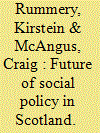

|
|
|
|
|
| Summary/Abstract |
Scotland has laid claim to being ‘different’ from the rest of the UK with regards to disability policy. This article examines the evidence for that with regard to long-term and social care, and discusses the possibilities opened up by the devolution of disability benefits. It asks whether Scotland will demonstrate policy divergence from the rest of the UK, and whether that is likely to be beneficial for disabled people. It argues that Scotland has the potential to create better social policies for disabled people, but faces significant challenges in doing so.
|
|
|
|
|
|
|
|
|
|
|
|
|
|
|
|
| 20 |
ID:
163737
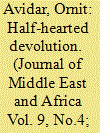

|
|
|
|
|
| Summary/Abstract |
Decentralization in countries around the world occurred as a form of structural revolution in redistribution of power in the 1980s and 1990s. In 2010, Kenya too went through a fundamental reform in which a new constitution was promulgated, which put into place a devolved system of government. This structural revolution has directly affected issues related to water governance in Kenya, but reflects similar trends and changes established internationally. This article reviews the devolution process in Kenya and its consequences. It delves into water legislation from the perspective of devolution and analyzes how devolution functions and objectives were formed with the new regulations. Finally, this study analyzes how policies and their ramifications are manifested on the ground in Siaya County in Western Kenya. The author applies mixed methodical methods of document review of the Constitution of Kenya 2010 and of the Water Acts 2002 and 2016 as well as open-structured interviews with relevant stakeholders and observations conducted in Siaya County on two field trips between July 2017 and February 2018. A close examination of the impact of devolution on the sustainable access to clean water in Siaya County will demonstrate that the transition to devolution and compliance with the 2016 Act have led to the surfacing of a host of problems including inadequate governance.
|
|
|
|
|
|
|
|
|
|
|
|
|
|
|
|
|
|
|
|
|